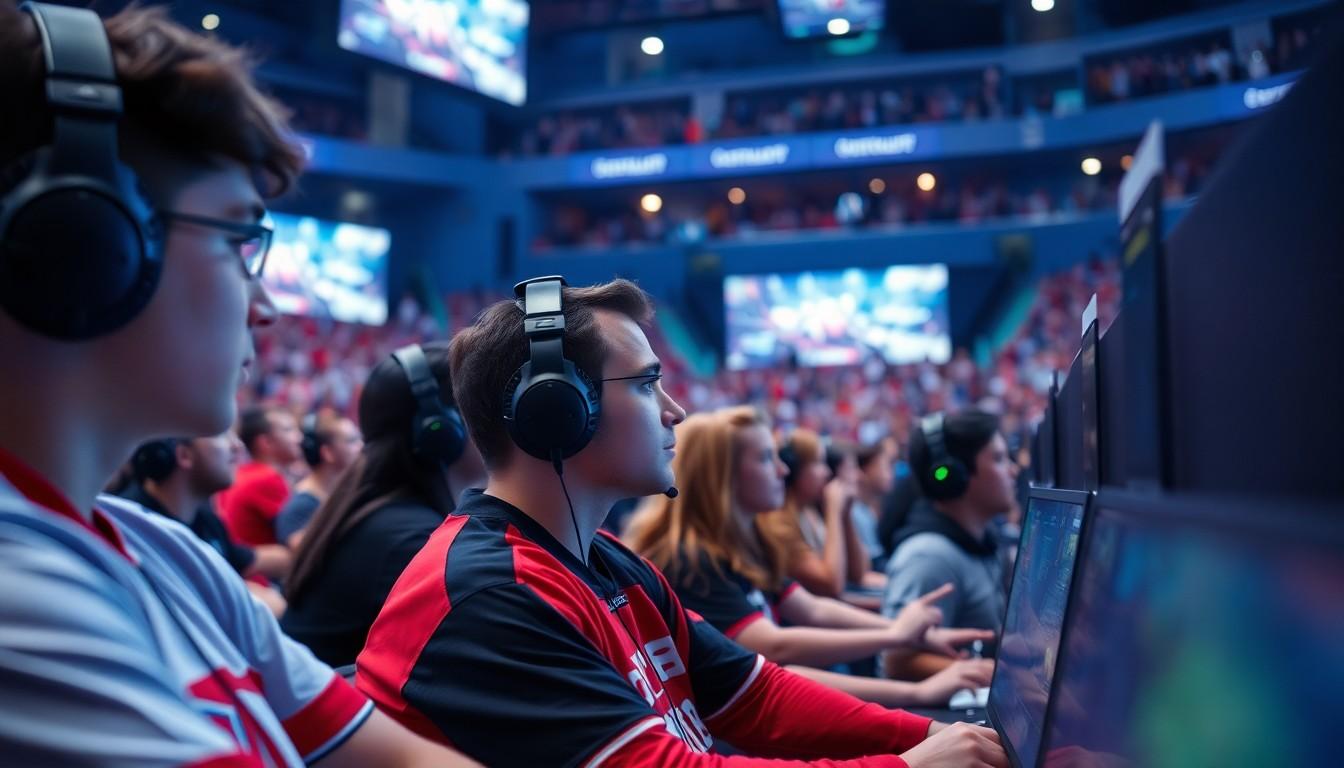In a world where sitting on the couch with a controller can lead to fame and fortune, esports and gaming have emerged as the ultimate playground for the modern-day gladiator. Gone are the days when gaming was relegated to the basement; now, it’s a billion-dollar industry where players compete for glory, sponsorships, and the occasional pizza delivery.
With tournaments drawing crowds that rival traditional sports, it’s clear that gaming isn’t just a hobby anymore—it’s a lifestyle. Whether you’re a casual player or a hardcore competitor, the vibrant universe of esports offers excitement, camaraderie, and a chance to be part of something bigger. So grab your headset and get ready, because this isn’t just about playing games; it’s about joining a revolution that’s changing the way we think about competition and entertainment.
Overview Of Esports And Gaming
The esports and gaming landscape has rapidly evolved into a multi-billion-dollar industry. Competitive gaming draws in millions of spectators, rivaling traditional sports like football and basketball. Major events such as the League of Legends World Championship and The International attract viewership in the millions.
Players, fans, and sponsors contribute significantly to this growth. Professional gamers participate in organized competitions, showcasing their skills to secure sponsorship deals and prize money. Brands engage with this audience, using marketing strategies tailored to gaming communities.
Games range from first-person shooters to real-time strategy titles. Diverse genres attract different demographics, creating a vibrant market. Titles like Fortnite, Call of Duty, and Dota 2 exemplify how competitive gaming transcends boundaries, uniting global audiences.
Communication within gaming communities fosters engagement. Online platforms like Twitch and Discord facilitate real-time interaction. Fans root for their favorite teams and players, establishing a sense of camaraderie and belonging.
Additionally, educational institutions now recognize esports as a legitimate career path. Some universities offer scholarships and degrees related to game design and management. This influx of support enhances the professionalism and sustainability of the gaming industry.
Esports also represent a cultural shift in entertainment. Traditional views of leisure and competition evolve as gaming becomes mainstream. The integration of technology and interactivity allows audiences to participate in unique ways, reshaping how they consume entertainment.
Popular Genres In Esports

Esports encompasses a variety of game genres that capture the interest of players and fans alike. Popular genres create engaging communities, offering unique competitive experiences.
Multiplayer Online Battle Arena
Multiplayer Online Battle Arena (MOBA) games dominate the esports landscape with titles like League of Legends and Dota 2. These games focus on team-based strategy, emphasizing communication and cooperation. Players control individual characters while working together to defeat opponents. Competitive events draw massive audiences, with prize pools often exceeding millions of dollars. Notably, the League of Legends World Championship attracted over 100 million viewers in its peak years. This genre fosters a vibrant community, as fans engage through streams, forums, and social media.
First-Person Shooters
First-Person Shooters (FPS) also hold a prominent place in esports, featuring titles such as Counter-Strike: Global Offensive and Call of Duty. Players compete in fast-paced environments, utilizing sharp reflexes and tactical thinking. Major tournaments generate significant viewership, with fans tuning in to watch professional teams battle it out. For instance, the CS:GO Major Championships routinely draw hundreds of thousands of live attendees and millions of online viewers. FPS games cultivate passionate fanbases, encouraging participation through community-led events and streaming platforms.
The Growth Of Esports Industry
The esports industry continues to expand rapidly, with various components contributing to its evolution.
Revenue Streams
Revenue streams diversify within esports, encompassing sponsorships, media rights, merchandise sales, and ticket sales. Sponsorships from major brands create significant revenue and elevate team visibility. Media rights agreements enhance revenue through broadcasting events on traditional and digital platforms. Merchandise sales, including team apparel and collectibles, add another lucrative revenue source. Ticket sales for live events generate substantial income, attracting thousands of fans who seek immersive experiences. Collectively, these streams propel the industry’s financial success, surpassing $1 billion in global revenue by 2022.
Viewership Statistics
Viewership statistics reveal impressive engagement within the esports scene. Events like the League of Legends World Championship draw over 100 million viewers, marking a major milestone in the industry. Major tournaments routinely attract millions of online viewers, reflecting the growing popularity of esports. Twitch and YouTube serve as essential platforms for streaming, where millions tune in to watch matches and interact with their favorite players. Engaging content and charismatic personalities significantly boost viewership. The evolving landscape illustrates esports’ ability to captivate audiences, comparable to traditional sports.
Impact Of Esports On Traditional Sports
Esports increasingly influences traditional sports dynamics. Traditional sports franchises often recognize the cultural and economic significance of esports, leading to investments and partnerships. Major professional sports teams, including the NBA and NFL, now own esports franchises, merging traditional and digital realms.
Sponsorship diversification emerges as a key intersection, with brands now targeting both esports and traditional sports audiences. Companies see value in connecting with demographics that spans gaming and traditional athletics. This synergy boosts brand visibility and enhances revenue opportunities for all parties involved.
Viewership patterns highlight another impact. Events like the League of Legends World Championship attract audiences comparable to Super Bowl ratings. Younger viewers, in particular, gravitate toward esports, prompting traditional sports leagues to consider strategies for engaging this demographic.
Moreover, traditional sports athletes increasingly participate in gaming, creating crossover appeal. Prominent figures like Stephen Curry and Serena Williams engage in esports, driving interest and bridging gaps between the two communities. By participating, they validate esports as a legitimate form of entertainment.
Incorporating esports into traditional sports venues has also become a trend. Stadiums host esports tournaments, attracting both gaming and sports fans, maximizing engagement and revenue. This combination enhances the fan experience, cultivating communities around both forms of competition.
Lastly, the educational landscape adapts, offering esports programs that align with traditional sports curricula. Institutions now provide scholarships for esports athletes, further legitimizing the field. This recognition contributes to shaping future generations of athletes, blurring lines between physical and digital competition.
The Future Of Esports And Gaming
Esports and gaming are poised for significant advancements that will shape their future landscape. Enhanced technologies like virtual reality and augmented reality promise to create immersive experiences for players and spectators alike. High-speed internet access expands opportunities for competitive gaming, particularly in regions where online play remains underdeveloped.
Audience engagement continues to rise, fueled by platforms such as Twitch and YouTube. These platforms attract millions of viewers, with events like the League of Legends World Championship hitting peaks over 100 million. The interactive nature of these platforms fosters real-time connections among fans, creating a community around shared interests.
Professional and collegiate integration emphasizes esports as a legitimate career path. Educational institutions now offer scholarships, degrees, and training programs, paving the way for future generations of esports athletes and professionals. Students gain valuable skills in game design, management, and marketing, making them competitively prepared.
Partnerships between traditional sports teams and esports organizations illustrate a merging of industries. Major leagues recognize the potential of esports, investing in franchises to capture younger audiences. Data shows that viewership patterns for esports mirror those of major sporting events, indicating that crossover engagement is increasing.
Sponsorship and revenue models adapt as brands capitalize on esports popularity. Diverse income streams now include merchandise sales, media rights, and ticket sales, which bolster the industry’s financial position. Projection estimates indicate that esports could surpass $3 billion in global revenue by 2025.
Overall, the future of esports and gaming holds immense potential for innovation, growth, and mainstream acceptance. As competition intensifies and investment continues, a vibrant and dynamic landscape emerges, inviting both players and fans to engage in this exciting evolution.
Conclusion
Esports and gaming have transformed into a dynamic force in the entertainment landscape. Their evolution from casual play to a billion-dollar industry reflects a cultural shift that resonates with diverse audiences. As technology advances and educational institutions recognize the potential within this field, the opportunities for players and fans alike continue to expand.
With major events drawing millions and traditional sports teams investing in esports, the industry is poised for remarkable growth. The integration of immersive technologies promises to enhance the gaming experience further. This vibrant community invites everyone to embrace the excitement of esports as it redefines competition and connection in the modern age.

